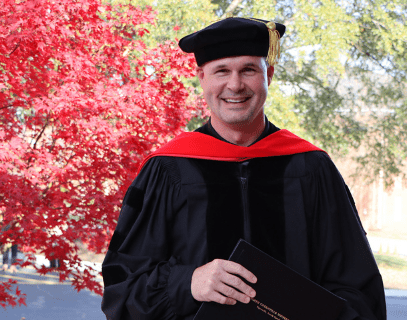Christ-centered. Ministry-focused.
Divinity

Explore your God-given calling while elevating your ministry at North Greenville University.
God’s Glory. Your Calling.
You shouldn’t have to choose between academic growth and practical ministry. That’s why our Master of Divinity program integrates an in-class curriculum with real-world impact. Explore classical theological and biblical frameworks in Old Testament, New Testament, and biblical interpretation. Engage applied disciplines such as evangelism, missions, discipleship, and spiritual formation.
Prepare for meaningful ministry and increase your impact as a Christian leader who makes a difference. Pastor, church planter, missionary, missions director, parachurch minister, and more. Elevate your calling with a Master of Divinity at North Greenville University.
Choose from the following concentrations to specialize in the area of your interest:
- Biblical and Theological
- Counseling and Pastoral
What Can I Do with a Master of Divinity?
Pursuing a divinity degree is a pathway to deepening your understanding of theology, spirituality, and religious studies. It is a journey of intellectual and spiritual exploration, equipping you with the knowledge and skills to engage in meaningful religious leadership, pastoral care, and community service.
By studying sacred texts, theological doctrines, and the history of religions, you’ll gain a comprehensive understanding of faith tradition and develop the ability to engage with complex religious and ethical issues. Embrace the opportunity to serve as a religious leader, guide others in their spiritual journeys, foster dialogue, and contribute to the well-being of communities through the application of theological insights and compassionate service.
Chaplain
Church Administrator
Missionary
Pastor
Religious Educator
Theologian
Study Ministry from a Biblical Perspective
- Core Courses
- Pastoral Ministry
- Church Health & Revitalization
- Discipleship & Spiritual Formation
- Missions & Evangelism
- Biblical Interpretation
- Christian Theology
- Personal Evangelism
- New Testament Survey
- Old Testament Survey
- Spiritual Formation
Choose three of the following:
- Introduction to Biblical Preaching
- Leadership Development in the Local Congregation
- Pastoral Ministry in the Local Congregation
- Pastoral Theology
- Basic Pastoral Counseling
- Minister as Pastoral Care Leader
- Pre-Marital and Marriage Counseling
Choose three of the following:
- Church Growth and Renewal
- Church Revitalization
- Christian Education in the Local Congregation
- Practicum in the Southern Baptist Convention
- Contemporary Issues in Church Growth
- Spiritual Gifts
Choose four of the following:
- Theology of the Christian Life
- Angelology and Spiritual Warfare
- Psalms and Christian Spirituality
- Contemporary Evangelical Spirituality
- Devotional Classics of the Christian Faith
- Prayer and Spiritual Awakening
- Discipleship
Choose four of the following:
- Contemporary Issues in Evangelism
- Evangelism and Chuch Planting
- Effective Evangelism in the Local Congregation
- Introduction to Christian Missions
- Christian Faith and World Religions
- Practicum in North American Missions
- Practicum in International Missions
- Foundations of a Christian Worldview
*You will also complete two elective courses of your choosing and a research thesis capstone after completing all of your core requirements.













